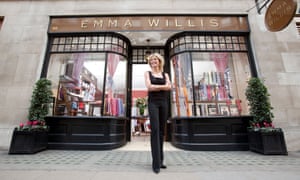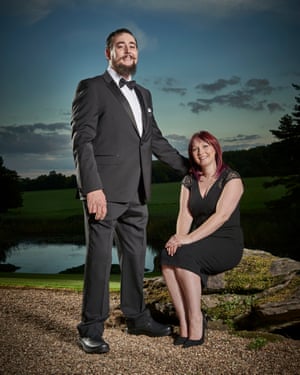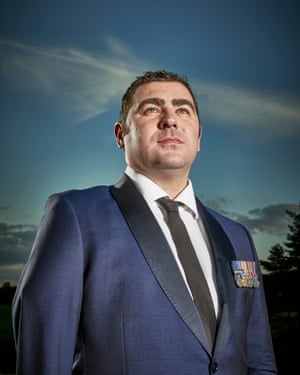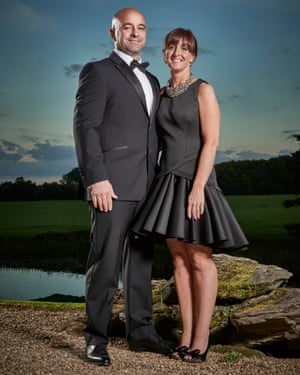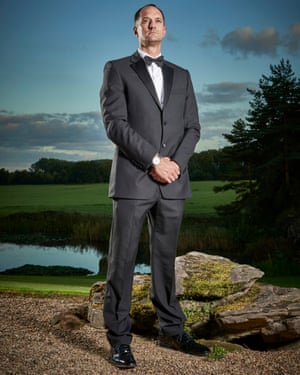Between 2006 and 2014, the Ministry of Defence calculates that 616 British soldiers were VSI – very seriously injured – in Afghanistan. At least 160 service personnel have had amputations while serving in Iraq and Afghanistan since the turn of the new century. To many of these men and women, Emma Willis MBE is nothing less than a fairy godmother.
Willis, a Jermyn Street shirt maker whose clients include Benedict Cumberbatch and Barack Obama, first had the idea of making bespoke shirts for wounded soldiers in 2008, after hearing a Radio 4 documentary on Headley Court, the military’s medical rehabilitation centre near Epsom, Surrey. “What really moved me was their lack of self-pity and their fear of leaving the forces,” Willis recalls. “I thought: ‘What can I do?’ Well, I make shirts, so I just saw it as going and giving a gift of gratitude, something small.”
Over the years her remit has expanded in unexpected ways through her charity Style for Soldiers. Now, through her connections, she organises everything from hand-carved ebony walking canes and £400 vouchers for M&S suits to mentoring and work placements. She even offered sessions with a sex therapist, though there were no takers for that. She throws parties, and the Christmas bash has become the biggest annual reunion of injured servicemen. When one double amputee told Willis he was getting married, she arranged for a donor to foot the bill for his honeymoon to Mauritius.
"If you spoke to my husband, he would say that Style for Soldiers has taken over my life."
“If you spoke to my husband, he would say that Style for Soldiers has taken over my life,” smiles Willis. “But it has opened up my world in a lot of ways. It’s so rewarding, I know that later on in life I’ll have been so happy to have done this. For the soldiers, they have a box that arrives in the post or a gift voucher, but for me I get a little thank you most days. Yesterday one chap sent a lovely message saying: ‘I got my job because of the shirt. They said I looked the part.’ To get one of those a day, that’s quite enough.”
Although the number of British soldiers being severely injured has decreased in recent years, Willis believes that, with the men and women now having to adapt to life on civvy street, the need for support has never been greater.
“It’s not an insurmountable number of people,” Willis continues. “We’ve got 750 soldiers on our database and these are numbers that could be coped with. They are all able to be identified and then kept in touch with. I think everyone feels the same: the public empathy for it would be 100%.”
Craig Winspear and Hayley Willson
Craig Winspear, 34, was a lance corporal in the Royal Pioneer Corps in Afghanistan. His job was as a “searcher” – looking for and destroying IEDs. In December 2011 he stood on one, and both his legs and some fingers had to be amputated. His partner Hayley Willson, 36, runs a gift shop in Bedfordshire.
Craig Winspear: I always wanted to join the army, but I had a daughter quite young, which prevented me going in. But as she got older, I was on hard times and it was a job. I was 26 and it put a roof over my head and money in my pocket. Being a searcher is not the safest of jobs, but it is one of the greatest. You are taking a lot of IEDs off the ground, but also weapon caches, so you are saving a lot of lives. The more bombs you get off the ground and the more weapons and explosives you take, there’s five, 10, 20 people whose lives you’ve just saved. So a good job in that respect, but it’s obviously intense. You’re also getting shot at while you’re digging for bombs.
"Emma Willis makes you feel smart and then she puts on an event for you to be smart at."
Hayley Willson: We’d only known each other six months before Craig got deployed to Afghanistan, nine months when he was injured. So a new relationship, but yeah, we’ve been together ever since.
CW: I remember Emma coming into Headley Court, where I was doing rehab. I was going to a wedding and she made me a shirt. I was in a horrible electric wheelchair then, so I didn’t really think much of what I looked like or anything. You fling your pyjamas on and go anywhere at that point. When you’re in your military uniform you feel 10ft tall, you stand proud. Emma Willis gives you a shirt that’s made specially for you and it makes you feel like that again – you’re proud, you’re 10ft tall again.
HW: When you go through a trauma, you do lose yourself. And he lost confidence. When Emma came, I remember Craig telling me there was this lady from a tailor’s, and she’d done these shirts. Then they get sent, and they arrive in a lovely box and you think: “This isn’t just a lady…”
CW: She sent us gifts: tea for two at the Ritz, things like that. Just randomly, you’ll get this package through and you open it, and it’s Emma again. It’s not just about making you feel smart – she makes you feel smart and then she puts on an event for you to be smart at.
Andy Reid
Andy Reid: I remember waking up in Selly Oak Hospital in Birmingham and the doctor coming over. He told me what injuries I had and my first thought was: “I’m a survivor, not a victim.” Unfortunately I’d previously seen a sergeant on a patrol I had been on, and seven friends from my unit all pass away, so I thought: “I’m still here!”
I wrote a diary when I was in Afghanistan and, after I was injured, that became a book, Standing Tall. A lot of guys nowadays suffer with PTSD and I think writing the book was very therapeutic; rather than me storing it in my hard drive I was downloading it on to paper. I’ve also written a shorter version for William, my little boy. He’s only four at the moment, but maybe when he’s about seven or eight, he can read that and understand what happened a little bit more.
William knows now, anyway. He’s like: “Oh where’s your arm?” And I’ll say: “I had an accident and it fell off.” And he says: “Has a bad man got it?” And I say: “No mate, a bad man hasn’t got it.” Some of the questions can be quite hard to answer, but the last thing you want is him growing up misunderstanding about Muslims or Afghan people, because in general they are very nice people.
I met Emma Willis in 2009 at Headley Court and I just thought: “What an amazing gesture from an amazing woman.” For my shirts she puts cufflinks in, but because I’ve only one arm she puts Velcro on the cuff, so I can put it on and take it off myself. It’s a very small thing, but massive in respect to my personal needs. And I’ve got two false legs, so you tend to sweat more. Your body disperses heat from the extremities so if your extremities are missing or they are wrapped up in silicone, your body can’t get rid of that heat. Having a lightweight cotton shirt helps you cool down a lot easier, which is fantastic as well.
Dave and Stacey Patterson
Dave Patterson: I was lucky to live, because the bomb went off underneath my seat. The vehicle I was in was left in the bottom of a hole that was 5m wide and 2m deep. I was at the bottom of that. And that was the end of that.
"It’s hard to explain what it felt like when I met Emma Willis – like someone cared."
Stacey Patterson: When I saw him in the hospital in Birmingham, he asked me to leave. He didn’t want me there. Then that hit home that it wasn’t David lying there. It was somebody else. And that person’s been there ever since. That’s hard. He’s not the man I married. The person I loved and who I knew disappeared that day. And when he came back he wasn’t the David I fell in love with. So I’ve had to learn to love somebody else.
DP: Our son Jack was two at the time.
SP: So Jack also now doesn’t know the David that was. He just knows his dad after injury. And I think Jack would have had a completely different experience of his dad before the injury. David became more aggressive, quick-tempered; when he came home, because he wasn’t in the army he used Jack to command almost. He wanted Jack to be regimental in what he did and he was just a child. He’s still a child. So that was where we argued, we were butting heads.
DP: I was down on the brain-injury ward at Headley Court when I met Emma Willis. It’s hard to explain what it felt like – like someone cared. And getting shown that someone was appreciative of what you’ve done. Having someone come to show that and say thanks.
SP: When David first got injured he could be self-destructive. Spend it, spend it, spend it, don’t pay the bills, spend it, spend it, spend it, don’t pay the bills.
DP: Because of the situation I was in with my head and my functional skills, the worst thing in the world the army did was give you the money without any help. That’s probably the worst thing you could do and they did it. I’m not blaming them for it, because it’s just the way it is.
SP: It’s different from the life I had before, but I’m not saying it’s a bad life I’ve got now. But it is different. And David’s home, he’s watching the kids grow up now, whereas before in the army he didn’t, so that’s good.
DP: Once you’re gone from the army, you’re gone. And I’m sad to say that. I never regret anything I did. What I did, I chose to do. So it’s not a regret, I thoroughly enjoyed it. But it’s sad, because you’ve got someone else you don’t even know, like Emma, who does everything for you.
Bruce Ekman
Bruce Ekman: When I was injured, they told me they were going to amputate my foot. I was sobbing – not because of my foot but because I thought my career was over. I knew nothing else. I grew up wanting to be a soldier. I couldn’t dream of doing anything else. I’m so fortunate, I thank God that I can continue to soldier now.
I think my injury humbled me a bit. You go from being fit, strong, confident, loud. One moment you’re there with all of your closest friends and you go from that to being injured. The army support network, Help for Heroes and Headley Court, are amazing, but once the guys leave that, they are home and they’ve got to get jobs. It’s a massive confidence hit.
Everything you’ve planned for, your hopes, your dreams, your career is gone. Emma Willis understands the vulnerabilities and she recognises the crushing blow to self-esteem of young, fit, happy soldiers who have got these injuries. Then she does something about it – and she does it personally and directly.
Charles Dickens wrote: “Any man may be in good spirits and good temper when he’s well dressed.” When I met Emma I was on crutches, I had my foot all pinned up. While she’s sizing a person up, she asks you questions, she finds out about you and about your life. I said it was my wife’s birthday coming up, and not long after – through one of her connections, who is a fashion editor – she posted us out a handbag.
I’ve just written my MBA thesis: “The Butcher, the Baker, the Fancy Shirt Maker”. It’s on Emma Willis’s context-focused philanthropy model: she does philanthropy but in what she’s good at, which is shirt-making and tailoring, and then she uses her connections.
Russell & Bromley has recently donated loads of pairs of shoes to the charity for people like myself, because I’m two different sizes after my injury and I struggle to get shoes, and then I need to buy two pairs. You couldn’t dream of support like that for an injured serviceman. You expect nothing, you ask for nothing, and she helps you in so many ways.


